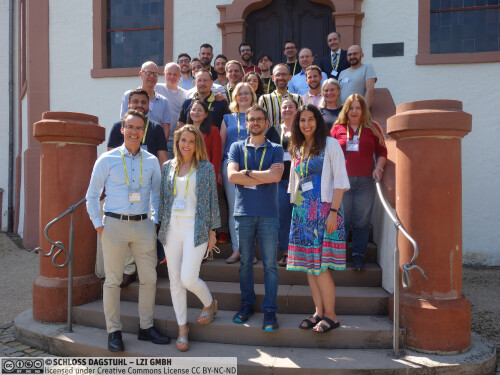Dagstuhl Seminar 24292
Improving Trust between Humans and Software Robots in Robotic Process Automation
( Jul 14 – Jul 19, 2024 )
Permalink
Organizers
- Adela del Río Ortega (University of Sevilla, ES)
- Andrea Marrella (Sapienza University of Rome, IT)
- Hajo A. Reijers (Utrecht University, NL)
- Adriana Wilde (University of Southampton, GB)
Contact
- Andreas Dolzmann (for scientific matters)
- Jutka Gasiorowski (for administrative matters)
Schedule
This summary provides an overview of the outcomes of our Dagstuhl Seminar “Improving Trust between Humans and Software Robots in Robotic Process Automation” (24292). It began with a general introduction to the aim, scope, and context of the Dagstuhl Seminar. The preliminary presentation was followed by a sequence of three invited talks required to clarify the main aspects investigated during the seminar. Specifically, Simone Agostinelli presented an “Introduction to Robotic Process Automation”, and Piercosma Bisconti introduced the basic frameworks to specify trust in autonomous systems in the talk “How to build trust between intrinsic and perceived trustworthiness”. Then, a third talk by Michael Rosemann discussed the existing research efforts to integrate trust into the BPM discipline in his talk: “Managing Trust in Business Processes”.
The background talks were followed by three-minute speeches, during which every participant could give a brief overview of their background, expertise, and personal expectations for the seminar. The seminar participants included experts from the BPM, RPA, HCI and Trust-aware AI communities, with industry representatives and researchers in academia at different levels of seniority.
Then, a plenary brainstorming session began, moderated by the seminar organizers. Every participant in the seminar could suggest a topic they would like to investigate together with the other attendees. The discussion resulted in a set of twenty arguments that were finally distilled together into the five research questions below:
- How trust is formed between humans and RPA technology?
- How to effectively calibrate and manage trust in RPA to align pre-implementation expectations with post- implementation realities?
- How to design trust-aware human-robot interaction in RPA?
- How to identify the right balance between autonomy and trust in RPA systems?
- How to guide organizations in creating a hybrid workforce of SW robots and humans?
From the second day on, time was mostly devoted to working groups, each discussing one of the research questions that were raised in breakout sessions. This activity was accompanied by “lightning talks”, i.e., brief presentations on issues that emerged during the discussions. Periodic intermediate group presentations reported on the advancement of the teams’ work. The final presentations of the results achieved by the working groups and a discussion of the continuation of the freshly established collaborations took place on the final day. The seminar was concluded with the plan for writing a common vision paper to establish the foundations of a new breed of trust-aware systems.
The full report contains all the talks held on the first day of the seminar, the lighting talks and the final working group reports.
 Adela del Río Ortega, Andrea Marrella, Hajo A. Reijers, and Adriana Wilde
Adela del Río Ortega, Andrea Marrella, Hajo A. Reijers, and Adriana Wilde
Robotic Process Automation (RPA) is an emerging technology that sits between the fields of Business Process Management (BPM) and Artificial Intelligence (AI). RPA allows organizations to automate high-volume and repetitive tasks – also referred to as routines – performed by human users. The enactment of these routines is emulated by means of a software (SW) robot that works on the applications' user interfaces (UIs) in the same way as the original human operators did.
From a research and industry perspective, RPA is receiving substantial attention because of its potential for a fast return on investment due to the rapid automation of routines that would free employees from operating on non-value-added tasks. Recent research studies conducted on the effectiveness of RPA within organizations have found that implementation of SW robots does not always lead to the assumed effect, and many SW robots are subsequently withdrawn. In consequence, the human workforce takes over robotized tasks to perform them manually again and, in practice, replaces back SW robots. The fact is that integrating RPA into a human workforce alters the role of human employees and dynamics within the workforce, fueling a lack of trust in RPA technology, an issue deemed increasingly significant given its widespread use in many working domains.
The human lack of trust in RPA technology is considered one of the major barriers to wider RPA adoption. In the AI and Information Systems (IS) fields, the absence of trust is a known hindrance to adopting technologies that introduce new forms of automation. The notion of automation historically carries a negative connotation from the human workforce perspective due to the fear of job loss. In RPA, where SW robots take over significant responsibilities from human employees, and their performance is vital for the successful execution of organizational processes, trust plays a critical role in its acceptance. Three major human-related aspects were identified as the main obstacles to the creation of human trust in RPA, namely: (i) the feeling that SW robots act as competitors of the human employees, fueling a resistance to accept automation opportunities; (ii) the need to set the right expectations concerning the real value RPA is going to bring to the human workforce; and (iii) the poor explainability of SW robots' decisions and actions, which may not be sufficiently transparent for human resources.
In an era where RPA is pushing the automation of human tasks to the extreme, providing organizational and technical solutions to improve trust between humans and SW robots becomes crucial. In this direction, this Dagstuhl Seminar aims to bring together leading experts from industry and academia engaged in diverse communities related to RPA, including BPM and Human-centered AI, intending to reflect on the current RPA principles, which fail to deliver sufficient attention to the interplay between the human workforce and SW robots. The overall goal is to explore the scientific and technological foundations to pioneer new trust-aware RPA solutions that work in partnership with the human workforce, to enhance human capabilities rather than replace human intelligence and break through the barriers to human trust using RPA. The seminar outcomes will serve as a basis to guide organizations in creating a hybrid workforce of SW robots and humans and chart a roadmap for future RPA research.
 Adela del Río Ortega, Andrea Marrella, Hajo A. Reijers, and Adriana Wilde
Adela del Río Ortega, Andrea Marrella, Hajo A. Reijers, and Adriana Wilde
- Simone Agostinelli (Sapienza University of Rome, IT) [dblp]
- Marco Angelini (Link University - Rome, IT) [dblp]
- Aleksandre Asatiani (University of Gothenburg, SE) [dblp]
- Bernhard Axmann (TH Ingolstadt, DE) [dblp]
- Piercosma Bisconti (Interuniversity Consortium f. Computer Sci. - Rome, IT) [dblp]
- Angelo Casciani (Sapienza University of Rome, IT) [dblp]
- Christian Czarnecki (FH Aachen, DE) [dblp]
- Adela del Río Ortega (University of Sevilla, ES) [dblp]
- Andrea Delgado (University of the Republic - Montevideo, UY) [dblp]
- José González Enríquez (University of Sevilla, ES) [dblp]
- Glenda Hannibal (Paris Lodron Universität Salzburg, AT) [dblp]
- Christian Janiesch (TU Dortmund, DE) [dblp]
- Andrés Jiménez Ramírez (University of Sevilla, ES) [dblp]
- Faizan Ahmed Khan (University of Padova, IT)
- Andrea Marrella (Sapienza University of Rome, IT) [dblp]
- Antonio Martínez Rojas (University of Sevilla, ES) [dblp]
- Artur Modlinski (University of Lodz, PL) [dblp]
- Ralf Plattfaut (Universität Duisburg-Essen, DE) [dblp]
- Jana-Rebecca Rehse (Universität Mannheim, DE) [dblp]
- Hajo A. Reijers (Utrecht University, NL) [dblp]
- Manuel Resinas (University of Sevilla, ES) [dblp]
- Michael Rosemann (Queensland University of Technology - Brisbane, AU) [dblp]
- Flávia Santoro (Inteli - São Paulo, BR) [dblp]
- Stefan Sarkadi (King's College London, GB) [dblp]
- Pnina Soffer (University of Haifa, IL) [dblp]
- Barbara Weber (Universität St. Gallen, CH) [dblp]
- Adriana Wilde (University of Southampton, GB) [dblp]
Classification
- Artificial Intelligence
- Human-Computer Interaction
- Other Computer Science
Keywords
- Robotic Process Automation
- Software Robots
- Human-centered AI
- Business Process Management
- Human-Computer Interaction





 Creative Commons BY 4.0
Creative Commons BY 4.0
